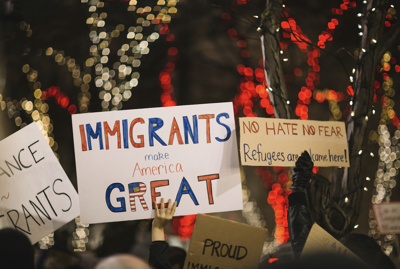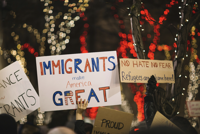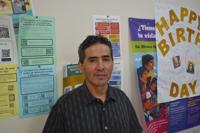
DACA, which was initially introduced by former President Barack Obama in 2012, aimed to protect Dreamers by allowing them to live and work in the U.S. Photo by Nitish Meena
As courts volley the fate of Deferred Action for Childhood Arrivals (DACA) back and forth like a political tetherball, the people most affected — DACA recipients — are once again left suspended in uncertainty.
The recent ruling from the U.S. Court of Appeals for the Fifth Circuit reaffirmed what many immigrant rights groups have long said: the protections offered by DACA are lawful and Judge Andrew Hanen’s prior interpretation is flawed. Still, legal ambiguity leaves a door open for fear to creep in. Over half a million people who live and work in the United States under DACA remain unsure of their future, many wondering what it means for their jobs, their families and their right to remain in the country they call home.
"The Fifth Circuit Court decision recently emphasized that protection from deportation for DACA recipients is lawful and that Judge Hanen is wrong in his interpretation of the law then, as DHS is now,” Angelica Salas, executive director of the Coalition for Humane Immigrant Rights (CHIRLA), said over email. “One official's misinterpretation of the law does not change legal protections for DACA recipients. We urge persons with DACA to consult with an immigration attorney before taking any measures that could jeopardize their status. We call on Congress to pass a pathway to citizenship, a permanent protection for more than 500,000 persons who live and work in the U.S. and have DACA.”
The decision preserves renewals but blocks new applications. For many young immigrants, it’s a sobering reminder that being in limbo is a constant in the American immigration experience. The program remains in place for now, a legal construct held together by precedent and executive discretion, but not cemented in law.
In the meantime, immigrant rights groups and immigration lawyers urge DACA recipients to act proactively. That means submitting renewal applications early, between 120 to 150 days before expiration, to prevent lapses in work authorization. It also means consulting with qualified attorneys about alternative legal pathways: family-based petitions, marriage to U.S. citizens, employment-based visas or, in rare cases, U-visas or VAWA protections. Some legal clinics across Southern California, including those run by CHIRLA and the Immigrant Defenders Law Center, offer low-cost consultations and screenings for potential eligibility outside of DACA.
Community organizations recommend building a "defensive folder" with all key documents: past DACA approvals, work permits, tax filings, and school transcripts. This helps attorneys quickly evaluate options if the program ends abruptly. Additionally, recipients are encouraged to sign up for legal workshops, stay updated with trusted immigrant advocacy groups and consider joining local coalitions that advocate for permanent protections.
Employment questions loom large. If DACA is revoked entirely, recipients would lose their work permits, rendering them ineligible to continue most forms of employment in the formal economy. Some recipients have begun quietly preparing for such an eventuality: seeking self-employment options, building freelance portfolios or turning to mutual aid networks for temporary support. Others are exploring entrepreneurship and independent contracting in fields like graphic design, childcare, domestic work and content creation, which may not require employer verification through E-Verify.
Labor attorneys stress that while employers would technically be unable to legally retain workers without valid work authorization, they are also not required to proactively terminate someone unless prompted by a verification audit. This gray area leaves some room, albeit a precarious one, for short-term solutions, particularly in smaller or informal workplaces.
Still, what can one do when merely existing in the U.S. and being able to work is a political debate? The very real threat of DACA’s demise has long-term emotional and economic effects. In interviews with outlets like Business Insider and The Guardian, young professionals and college graduates enrolled in DACA express the same ache: the desire to contribute fully to the only country they have known, yet constantly facing a system designed to keep them in a state of fragility.
Camila Hernandez, a 23-year-old DACA recipient with a degree in public health, told Business Insider she’s tired of building a future on sand. "Every time we get close to certainty, they take the rug out from under us."
The fragility isn’t abstract. An estimated 1,000 DACA recipients could lose their jobs each week if protections are overturned. The effect would ripple through sectors from education to healthcare to the service industry, disproportionately affecting Latino, Black and Asian immigrant communities across Southern California.
For now, recipients are advised not to panic but to prepare. Legal experts caution against international travel, major job changes or self-deportation without seeking legal counsel. The call is to stand firm, but not to stand alone.
DACA was never meant to be a permanent solution. It was a stopgap, an executive compromise born from congressional inaction. The solution, many argue, still lies in Congress’s hands.
"We call on Congress to pass a pathway to citizenship," Salas reiterated, "a permanent protection for more than 500,000 persons who live and work in the U.S. and have DACA."
Until then, DACA recipients wait. Not idly, but actively. They renew paperwork. They organize. They love. They work. They research backup plans and seek legal second opinions. They ask employers about future flexibility or sponsorship possibilities.
For many immigrants, uncertainty has been a place of creation and survival. If and when DACA is revoked, there are organizations like CHIRLA and theDream.us.
In what has been an ongoing campaign and project, the latter is one of many organizations thinking of legal and accessible pathways for immigrants to pursue careers on their own terms and legally.











(0) comments
Welcome to the discussion.
Log In
Keep it Clean. Please avoid obscene, vulgar, lewd, racist or sexually-oriented language.
PLEASE TURN OFF YOUR CAPS LOCK.
Don't Threaten. Threats of harming another person will not be tolerated.
Be Truthful. Don't knowingly lie about anyone or anything.
Be Nice. No racism, sexism or any sort of -ism that is degrading to another person.
Be Proactive. Use the 'Report' link on each comment to let us know of abusive posts.
Share with Us. We'd love to hear eyewitness accounts, the history behind an article.